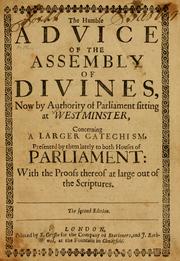Wednesday @ Westminster: Why Do I Exist?

Feb 10, 2016
 Why do I exist? This is what the opening question of the Westminster Larger Catechism is all about:
Why do I exist? This is what the opening question of the Westminster Larger Catechism is all about:What is the chief and highest end of man?Man's chief and highest end is to glorify God, and fully to enjoy him forever. (Q&A 1)
Our Ultimate Question
“What is the chief and highest end of man?” This is our ultimate question and should be the heartbeat of who we are, thinking of it daily. This is what it is all about as a Christian. To have a “chief end” means that we were made for something, that we have a main purpose in life. And we have a “highest end,” among the many goals and accomplishments of our lives.
The Larger Catechism speaks of our chief and highest end as being twofold: “to glorify God” and “to enjoy God.” This is what Peter meant when he said that we are “being built up as a spiritual house, to be a priesthood, to offer spiritual sacrifices acceptable to God through Jesus Christ” (1 Peter 2:5) and when he said “you are a chosen race, a royal priesthood, a holy nation, a people for his own possession, that you may proclaim the excellencies of him who called you out of darkness into his marvelous light” (1 Peter 2:9).
Our Ultimate Goal
This is also our ultimate goal. Our forefathers were enlivened by the phrase soli Deo gloria—to God alone be the glory. What it says to the question of “why do I exist” is that we do not exist for ourselves—our needs, our pleasures, or our desires.
We exist to glorify God even before we have received anything from him. This is what Psalm 29 teaches when it says, “Ascribe to the Lord the glory due his name” (v. 2a). Literally this phrase in Hebrew is “the glory of his name,” but all translations say “the glory due his name” because that is an accurate interpretation of what is being commanded.
But what does it mean to “glorify” God? The Hebrew word kavod most often means heavy, or weighty. The weightiness of gold, for example, comes to mean that it is honored. To glorify God, then, is to consider the supreme worth of who he is, then to magnify and exalt his name above all others as the way to honor the excellent dignity of his greatness. We are called to hallow, honor, and lift up the name of the Lord, Father, Son, and Holy Spirit.
We are to glorify God in our thoughts. Peter says to us, “Therefore, preparing your minds for action, and being sober-minded” (1 Peter 1:13). Our glorifying of God begins with the head, trickles down to the heart, and then moves out to the hands. David says, “On the glorious splendor of your majesty, and on your wondrous works, I will meditate” (Ps. 145:5). How often do you think about God? Do you stop and think what he has done much?
We are to glorify God in our words. The work of Christ has made us a a royal priesthood for this purpose: “that you may proclaim the excellencies of him who called you out of darkness into his marvelous light” (1 Peter 2:9).
We are to glorify God in our deeds. In Ephesians 2:10 we read: “For we are his workmanship, created in Christ Jesus for good works, which God prepared beforehand, that we should walk in them.” Our heavenly Father has taken us, lifeless lumps of clay, and molded us into a masterpiece to bring him glory. Paul speaks of our deeds being for the glory of God when he says, “present your bodies as a living sacrifice” (Rom. 12:1). Peter says, “Keep your conduct among the Gentiles honorable, so that when they speak against you as evildoers, they may see your good deeds and glorify God on the day of visitation” (1 Peter 2:12). Notice that, as we glorify God in our deeds God uses these fruits of the Holy Spirit to cause the world to glorify God.
Our Ultimate Enjoyment
This is also our ultimate enjoyment. To “enjoy” God means to have fellowship with him. The Larger Catechism does not just say that we are to enjoy God, but that we are “to fully enjoy him forever.” As the great Benefactor of the covenant of grace, God gives us himself with all his benefits for our enjoyment. We enjoy him in this life by faith and in the life to come, in the fullness of sight and experience. We enjoy God in our present state of grace as in a glass dimly, but we will enjoy him in the future state of glory face to face. Now is the age of pilgrimage; then is the age of eternal rest. 1 John 3:2 says, “Beloved, we are God’s children now, and what we will be has not yet appeared; but we know that when he appears we will be like him, because we shall see him as he is.”
Why do I exist? I exist to give the God who made me glory with my whole being because he has given himself wholly to me. I also exist to enjoy this Triune God in this life by faith but in the life that is to come in fullness of sight and experience. As John Calvin said, “We are God’s; therefore, let his wisdom and will preside over all our actions. We are God’s; to him, then, as the only legitimate end, let every part of our life be directed” [Institutes, 3.7.1]





